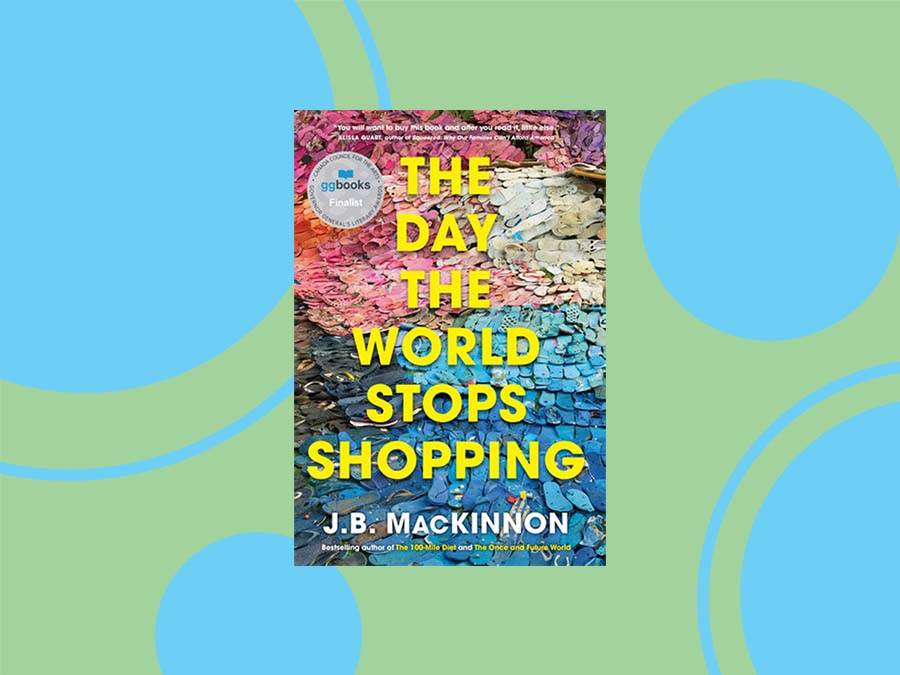
What would happen if the world suddenly stopped shopping? Beyond the economic impact of this action, how would this affect the state of the world? If we stopped shopping all together, what would society and the planet look like if we consumed less? And could we stop shopping to such an extent in the first place?
JB MacKinnon considers these questions in his latest book, The Day the World Stops Shopping. He came to discuss his book in the Orion Lecture Series at UVic on Tuesday, October 19th. In this thought experiment, the world imagined was one where consumer spending was cut by 25 per cent. MacKinnon uses real world case studies and interviews with expert sources to try to determine what a spend-less world could possibly look like.
Throughout his career as a non-fiction writer with a focus on the environment, MacKinnon began to see consumption as a root problem that wasn’t getting much attention. As defined by MacKinnon, consumption is the utilization of goods, services, or experiences that we make use of.
So if we cut down on our consumption, what would this world look like? How would it change?
To some it would be an economic disaster. However, we would see a resurgence in the natural world and a reduction of both carbon emissions and of the environmental impacts of climate change.
“Every dollar spent in the consumer economy generates carbon emissions,” MacKinnon said. “That also…means that if you don’t have very much money to spend, you’re probably not the problem.”
And it’s not like lower-consuming societies aren’t feasible. MacKinnon cites Ecuador as an example. He says people in Ecuador are consuming at a rate that is sustainable. Meaning, if everyone cut down their spending of products and goods to Ecuador’s rate, it would be sustainable for the planet we have.
MacKinnon views the economy and society as something that isn’t outside of our control — it is adaptable and changeable depending on the people it serves, not the other way around.
“If we learned anything in the pandemic, it’s that the economy is adaptable. So this idea that we simply cannot reduce consumption because the economic consequences would be unbearable … I don’t think that’s as believable now as it was before the pandemic.”
As an example, now that people are aware that working from home is an option, people are fighting for that option to remain viable. The problem isn’t so much on the individual, but rather the consumer society that we are forced to participate in.
“There’s a lot of pressures on us to consume, and it’s very easy for us to consume. And it’s how we do a lot of things, like express our identities, or show caring for one another we buy things and give gifts,” explained MacKinnon. “One of the arguments I make in this book is that we shouldn’t just be asking individuals to consume less, we should be actually trying to restructure society in such a way that we consume less.”
So how do we restructure society? MacKinnon explains that a small-scale example would be something such as ‘Right-to-Repair’ legislation, which is being looked at in the U.S. and Europe. Right-to-Repair legislation puts the idea that companies should make their products repairable into policy, while also introducing reduced or zero taxes on goods that are repaired. ”Then you start to rebuild a world in which products are repairable,” said MacKinnon. ”Then there are people out there to repair them, and that becomes an actual important sector of the economy. That can … directly reduce the need for people to buy new things.”
A much bigger example that MacKinnon gives is to tackle inequality. Countries that consume more often have a larger rich-poor gap because people are encouraged to continue consuming and chasing better, richer lifestyles.
But what MacKinnon stresses as the most important thing people can do at the moment is drive the conversation forward about consuming less. “The most important thing right now is just for people to talk about it again,” said MacKinnon. “Right now people very rarely are like ‘people consume too much stuff,’ like look at how many people on social media are showing off their consumption… Why is no one ever raising the question [of] ‘why are we idealizing this kind of consumption or this kind of lifestyle.’ Just raising those kinds of questions and starting to talk about it is really important right now.”
While the problem rests with society, individuals can begin to question if they need to buy as many things.







